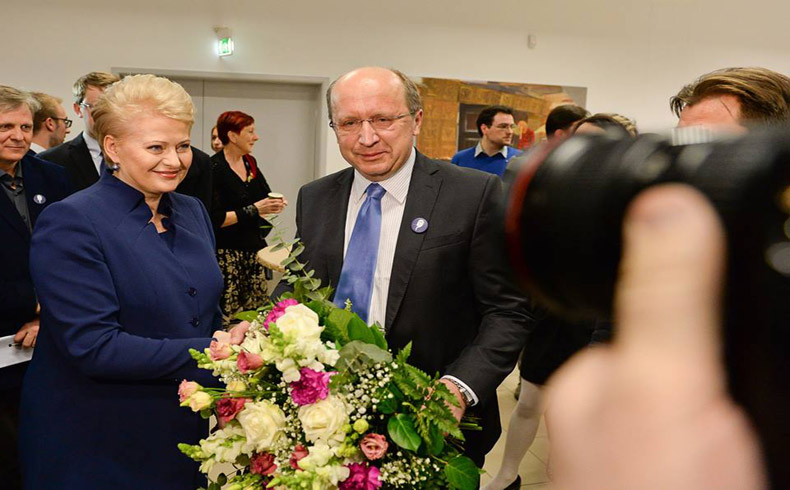
By Liudvikas Jakavicius-Grimalauskas
Conservative Dalia Grybauskaite, better known in northern Europe as “The Baltic Iron Lady” is leading the vote count in the presidential elections held in her country last Sunday May 11, with 46.50% of the vote. However, she has failed to avoid a second round, which is scheduled for May 25, because she has not surpassed 50% plus one of the votes to claim the much-desired “absolute majority”.
Pre-election polls held by various political scientists gave her more than 50% of voting intent, because in 2009 she had reached 69.10%. With 97% of the votes counted, Grybauskaite has obtained 46.50% of the votes and now has to wait until the official count of the ballots of Lithuanians living abroad ends this Friday, May 16. However, with the majority of the votes cast from the diplomatic missions already counted, it is mathematically impossible to avoid a second round.
Favorite
Despite all this, no one can deny that she is the mostly accepted candidate by citizens and also, although not affiliated with any political party, she has the support of “Homeland Union – Lithuanian Christian Democrats” (Tevynes Sajunga – Lietuvos Krikscionys Demokratai) which is the nation’s most important conservative party and is chaired by the current Prime Minister, Andrius Kubilius, who has officially given her his unconditional support and who has not presented himself or any other person as candidate for the party.
In the case of Grybauskaite, the second round is not more than a mere “bureaucratic process”, as it is virtually impossible for any candidate to overrun her, since her biggest rival, a member of the European Parliament, Zigmantas Balcytis, has only 13.84% of the votes.
Change of trend
However, although both the 2009 and the 2014 elections had a similar level of electoral participation with a “voter turnout” of 51.80% and 52.14%, respectively, and although voter turnout was almost the same and that Grybauskaite won again by a wide majority, one can clearly see that there has been a change of trend that has benefited the “left” which went from 19.30% to 30.25% of the votes. This shift has been noticeable since now the “left” represents 30.25% of the electorate instead of 19.30%, while the “right” has come to represent 61.38%, instead of 76.01% that it represented in 2009. We should wait for the next election to see whether the “left” steps back again or if it really becomes an “opposition political force.”
Legacy
Single, childless and fifty-eight years old Dalia Grybauskaite has earned the nickname “The Baltic Iron Lady” because of her strong character, solid pro-European principles and strong opposition to the Russian Federation expansion policy.
With a degree in Economics from the University of St. Petersburg, a PhD from the Russian Academy of Sciences, a degree from the School of Foreign Service of Georgetown University and being multilingual, as she is able to speak fluently Lithuanian, English, Russian and French, Grybauskaite is destined to leave a strong legacy:
– INTRODUCTION OF THE EURO IN LITHUANIA.
– ADMISSION OF LITHUANIA AS AN OECD MEMBER.
– ENERGY INDEPENDENCE.
– INCREASE OF DEFENSE SPENDING UP TO 2% OF GDP.
– COMPLETION OF RAIL BALTICA.
– INCREASE OF THE GDP PER CAPITA FROM USD 16,470 IN 2009 TO USD 31,657 IN 2019, SURPASSING PORTUGAL AND GREECE BY THEN, AND ALMOST EQUALING ITALY AND SPAIN
Having successfully held various positions of responsibility at a national level and at the European Union, including Minister of Finance and European Commissioner for Financial Programming and Budget, if Lithuania follows the same political and economic path, Dalia Grybauskaite is heading to leave the country in a much better situation than it was in 2009 when she took office.
Opinion
In recent years, the popularity of this Lithuanian president has dropped moderately due to the austerity measures that she was forced to apply to cope with the economic crisis and place Lithuania among the countries with the highest rate of growth in the European Union. However, in recent months, her popularity has picked up due to her firm decision to openly support Ukraine, to keep its territorial integrity and to encourage its entry into the European Union. The president believes that Russia is trying to impose rule by force and that it is a direct and overt threat not only for Ukraine but for all the countries that used to be part of the Soviet Union, and even to the rest of Europe.
Grybauskaite, a politician who does not mince words and is a black belt in karate, spared no words during the election campaign by declaring that she is “decided to take up arms by myself if national security so requires,” and for that reason a large part of the Lithuanian people feel that Dalia Grybauskaite has the ability to ensure national security, which has resulted in a rise of her popularity, even though the “left” has managed to climb a few points in the polls.
Although her popularity has declined in recent years, one cannot deny that Grybauskaite has dodged an economic catastrophe and, if the current political and economic trends persist, she is very likely to leave power bequeathing as a legacy all the points set forth above.
From my point of view, the support that “Homeland Union – Lithuanian Christian Democrats” is providing her is owed to the fact that the party knows that she is the most popular candidate in the country and is doing an excellent job, as well as she shares the party’s ideology.
For that reason, in 2019, it is quite possible that the “right” regains its popularity thanks to the legacy of the “Grybauskaite Era,” and then it would be a good opportunity for “Homeland Union – Lithuanian Christian Democrats” to launch Andrius Kubilius as a presidential candidate. Will Kubilius be Grybauskaite’s successor in 2019?
PHOTO COURTESY -TS-LKD & DALIA GRYBAUSKAITE




